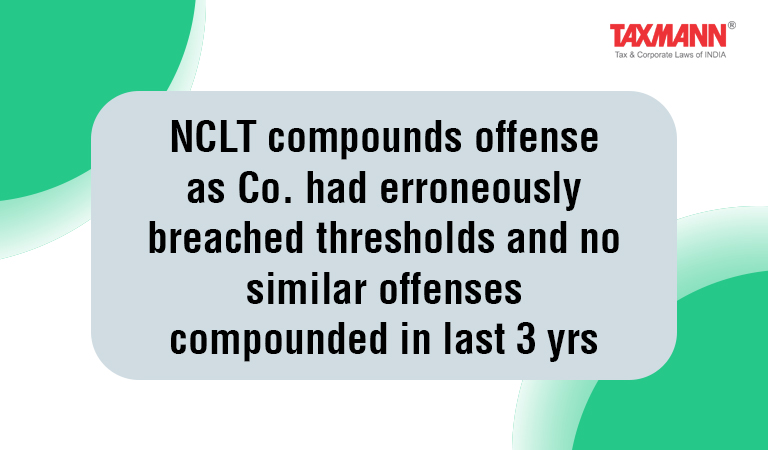NCLT compounds offense as Co. had erroneously breached thresholds and no similar offenses compounded in last 3 yrs
- Blog|News|Company Law|
- 2 Min Read
- By Taxmann
- |
- Last Updated on 4 December, 2021

Case Details: Capital Small Finance Bank Ltd. v. Registrar of Companies - [2021] 133 taxmann.com 18 (NCLT-Chd.)
Judiciary and Counsel Details
-
- Harnam Singh Thakur, Judicial Member and Subrata Kumar Dash, Technical Member
- Anand Chhibbar, Sr. Adv. Vaibhav Sahni and Shikhar Sarin, Advs. for the Petitioner.
Facts of the Case
In the instant case, a petition was filed by Capital Small Finance Bank Limited (applicant company) for the compounding of offenses and payment of the compounding fee. It was submitted that the applicant company had erroneously, inadvertently and under bonafide mistake breached the thresholds provided under Section 67(3) of the Companies Act, 1956.
Further, it was said that the offense relating to default under Section 67(3) of Companies Act, 1956 was the first offense and that the applicants have not previously filed any application, writ petition, suit, or initiate any other legal proceeding concerning the subject matter of the present application before any court of law or other authorities or any other Bench of the NCLT.
It is prayed that the offense under Section 67(3) of Companies Act, 1956 be compounded and a lenient view is taken, and a reasonable compounding fee is levied.
As per the provisions of Section 441(1) of Companies Act,2013, compounding can be made of any offense punishable under the Act whether committed by a company or any officer thereof not being an offense punishable with imprisonment only or punishable with imprisonment and also with fine.
Section 441(6) also reiterates that any offense which is punishable under the Act with imprisonment only or with imprisonment and also with a fine shall not be compounded.
Likewise, the report of the RoC states that no similar offense was compounded in the last three years and thereby Section 441(2) of the Act does not become applicable. It can be seen from the records of the applicant company that an exit option to all the 470 identified current holders of the security has been made.
NCLT Held
In the present case, the company has made an application suo motu and has stated that this or similar offenses have not been compounded during the last three years. It is also seen that the company has availed of exit opportunities.
Given aforesaid, NCLT considered it was reasonable to compound the offense under Section 67(3) of the Companies Act, 1956.
Disclaimer: The content/information published on the website is only for general information of the user and shall not be construed as legal advice. While the Taxmann has exercised reasonable efforts to ensure the veracity of information/content published, Taxmann shall be under no liability in any manner whatsoever for incorrect information, if any.

Taxmann Publications has a dedicated in-house Research & Editorial Team. This team consists of a team of Chartered Accountants, Company Secretaries, and Lawyers. This team works under the guidance and supervision of editor-in-chief Mr Rakesh Bhargava.
The Research and Editorial Team is responsible for developing reliable and accurate content for the readers. The team follows the six-sigma approach to achieve the benchmark of zero error in its publications and research platforms. The team ensures that the following publication guidelines are thoroughly followed while developing the content:
- The statutory material is obtained only from the authorized and reliable sources
- All the latest developments in the judicial and legislative fields are covered
- Prepare the analytical write-ups on current, controversial, and important issues to help the readers to understand the concept and its implications
- Every content published by Taxmann is complete, accurate and lucid
- All evidence-based statements are supported with proper reference to Section, Circular No., Notification No. or citations
- The golden rules of grammar, style and consistency are thoroughly followed
- Font and size that’s easy to read and remain consistent across all imprint and digital publications are applied



 CA | CS | CMA
CA | CS | CMA
